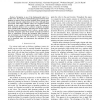Free Online Productivity Tools
i2Speak
i2Symbol
i2OCR
iTex2Img
iWeb2Print
iWeb2Shot
i2Type
iPdf2Split
iPdf2Merge
i2Bopomofo
i2Arabic
i2Style
i2Image
i2PDF
iLatex2Rtf
Sci2ools
IROS
2006
IEEE
2006
IEEE
Learning Relational Navigation Policies
— Navigation is one of the fundamental tasks for a mobile robot. The majority of path planning approaches has been designed to entirely solve the given problem from scratch given the current and goal configurations of the robot. Although these approaches yield highly efficient plans, the computed policies typically do not transfer to other, similar tasks. We propose to lational decision trees as abstract navigation strategies from example paths. Relational abstraction has several interesting and important properties. First, it allows a mobile robot to generalize navigation plans from specific examples provided by users or exploration. Second, the navigation policy learned in one environment can be transferred to unknown environments. In several experiments with real robots in a real environment and in simulated runs, we demonstrate the usefulness of our approach.
Related Content
| Added | 12 Jun 2010 |
| Updated | 12 Jun 2010 |
| Type | Conference |
| Year | 2006 |
| Where | IROS |
| Authors | Alexandru Cocora, Kristian Kersting, Christian Plagemann, Wolfram Burgard, Luc De Raedt |
Comments (0)

